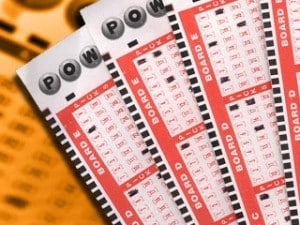
The jackpot is up, and the call of 100+ million dollars is too strong to resist. It’s time to buy a lottery ticket. If you read that and wholeheartedly agreed, then you might be one of 50% of Americans that partake in various forms of the lottery. It can be the mega powerball or just a scratch off, but at least half our nation plays. In fact, we spend 60 billion dollars a year on it. Though this is a big number, you may wonder what that translates to per person. The average American spends $650/year on lottery tickets, and that number grows every year. Considering the astronomic odds, wouldn’t it be wise to save $650/year versus throwing it away?
Some will read this and say it’s only a couple bucks here and there, what harm is there? Besides, it’s fun. Others will say spending money on lottery aids in taxes or with schools. But did you know lotteries only contribute about 1 to 2% of a state’s budget. In fact, its contribution is so minimal that playing the lottery often still has zero effect on the occasional need for tax increases. The same is true for school contributions. Truly, buying into the lottery doesn’t really help anyone. To make matters worse, the vast majority of lottery players are low income groups. By that I mean that the lottery is just an unattainable tease to individuals and families that can’t afford to be throwing money away to begin with. Yet, the lure is so strong that a study conducted back in 2002 showed Americans spending more on the lottery than on books or movies. Nine years later, and this fact remains true. And still, those involved in the running of the lottery make it harder and harder to resist. Case in point, the lottery continues to target/attract younger crowds with easier/faster games. The popularity of scratch offs is climbing so rapidly that many places have increased their price per ticket, and people are still buying them. In an age of technology and convenience, today’s young adult is constantly seeking quick accessible means for a fast win. Knowing this, lottery personnel are currently trying to circumvent a federal law that prohibits gambling via smart phones. Currently, only 3 to 5% of adults in the US suffer from gambling addiction. If lottery makers have their way, adding a lotto app to smart phones, that 3 to 5% is expected to triple. Even as I type this, around the nation, lottery vending machines are cropping up all over the place.
At this point you may be thinking that convenience doesn’t necessarily mean participants will become addicted to gambling. You could be right, but consider this: 82% or lottery revenue is generated by the same 20% of players. These people aren’t exactly addicted; but nonetheless, such a small percentage of players being responsible for such a large percentage of revenue means the lottery siren call is powerful enough to get people to play at least once per day. And at prices of $1 up to $50 per ticket, wasted money adds up fast.
I understand the fun factor, but when you consider the odds of winning a large jackpot is 1 in some number in billions, was it fun giving away 5 bucks or so for nothing? Next time you get the urge to play, try this; hand a wealthy person a $5 bill for no reason and walk away. Did that feel good or fun? No, it probably did not, but it gets the point across. At the very least I hope this imagery will have you second guessing wasting hard earned money on something that has almost no chance of return. Just say no; lottery is not worth the gamble.
Image Credit: The Gospel Blog